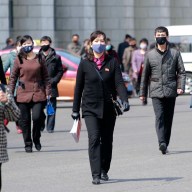By Amedee Mwarabu
KINSHASA (Reuters) – Congo’s President Joseph Kabila will not stand in the election scheduled for December, a spokesman said, finally agreeing to obey a two-term limit but picking a hard-core loyalist under European Union sanctions to stand instead.
The announcement on Wednesday by spokesman Lambert Mende that former interior minister Emmanuel Ramazani Shadary would represent Kabila’s ruling coalition in the Dec. 23 vote came just hours before the deadline to register candidates.
“We are all going to align behind (him),” Mende said.
Kabila was due to step down in 2016 at the end of his constitutional mandate, but the election to replace him was repeatedly delayed. That sparked protests in which the security forces killed dozens of people, and stoked militia violence in Democratic Republic of Congo’s volatile east.
Kabila had come under strong pressure from regional allies such as Angola as well as the United States and EU to stand down.
The selection of Ramazani, 57, is, however, a defiant move. He is under EU sanctions for alleged human rights abuses, including deadly crackdowns by security forces on protesters.
Kabila’s choice of a die-hard loyalist suggests that the president, who came to power after his father’s assassination in 2001, intends to remain closely involved in national politics.
A Ramazani victory could lead to a continuation of Kabila’s policies, including a tough line on the mining sector, where foreign investors hope the government will walk back steep tax hikes approved earlier this year.
Congo is Africa’s top producer of copper and the world’s leading miner of cobalt, which is prized for its use in batteries for electric cars and other electronics.
KABILA PULLS THE STRINGS?
Kabila will remain at the head of his People’s Party for Reconstruction and Democracy (PPRD) and has installed loyalists across the federal bureaucracy, including in the courts and in the military.
But the announcement that he will not run again will ease fears in the region and beyond that a Kabila candidacy would drag the country back into the civil wars of the turn of the century in which millions died, mostly from hunger and disease.
“What matters for the moment is that the constitution, whether willingly or not, has been respected,” said Senator Jacques Ndjoli of the opposition MLC party of former vice president and presidential candidate Jean-Pierre Bemba.
“Despite the multiple attempts to circumvent the constitution, President Kabila finally understood that the supreme law applies to everyone.”
The election should now herald Congo’s first democratic transition of power following decades marked by authoritarian rule, coups and deadly conflict.
Ramazani, a former governor of the eastern province of Maniema, served as interior minister from late 2016 until this February, when he was named permanent secretary of the PPRD.
He is a combative defender of Kabila and oversaw repeated crackdowns on protesters and pro-democracy groups as interior minister, especially in the aftermath of Kabila’s refusal to quit power when his mandate expired in December 2016.
In May last year, the EU slapped a travel ban and asset freeze on him for his involvement in “planning, directing or committing acts that constitute serious human rights violations”.
Several opposition candidates, including Bemba and the president of Congo’s largest opposition party, Felix Tshisekedi, have also registered to run.
They fear the goodwill Kabila could earn from not seeking a new term could make it easier for his coalition to cheat and are concerned about voter rolls they say are faulty and electronic voting machines due to be used for the first time.
His supporters dismiss these concerns.
“Today, Kabila has shown that he is the father of democracy in Congo,” Patrick Nkanga, a PPRD official, told Reuters by telephone.
A nationwide opinion poll last month showed opposition candidates collecting a significant majority of the vote with potential candidates from the ruling coalition trailing far behind.
Ramazani did not receive enough votes to be included in the poll’s results.
(Reporting by Amedee Mwarabu; Writing by Aaron Ross; Editing by Tim Cocks and Alison Williams)












